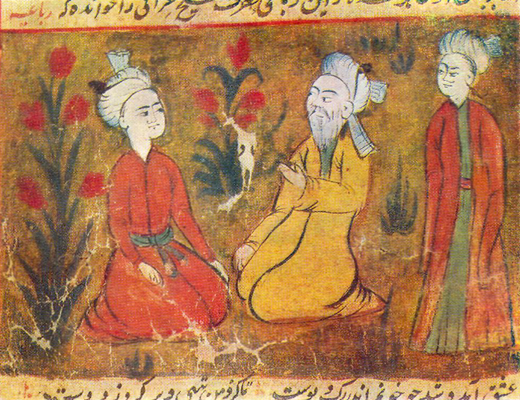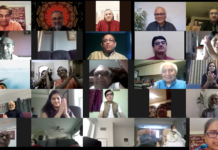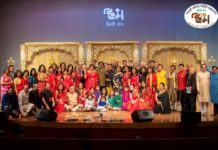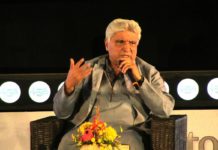By Akanki Sharma
New Delhi– In today’s digital era where technology has almost swamped art in all its forms, has Urdu literature once famous for poetry — especially the verse forms of the ghazal and nazm — lost its charm too?
For centuries, the concept of ‘Mushaira’ — an event called mehfil where poets gather to recite their poems — has been ruling the hearts of people.

With Amir Khusro who started writing Urdu poetry in the 13th century, the trend of ghazal and shaayari began. Years later, several renowned poets like Bahadur Shah Zafar, Mirza Asadullah Beg Khan (Ghalib), Mir Taqi Mir and Faiz Ahmed Faiz, among others, brought the essence of Urdu poetry and its recitation at Mushairas into limelight.
Now ‘Rekhta’ Foundation — one of the world’s largest websites for Urdu poetry and literature — is working to restore ‘Mushaira’ to its true form.
Established in 2013, Rekhta recently organised ‘Shaam-e-Sher,’ an event that provided a platform primarily to the budding poets who are fond of writing Urdu poetry.
Veteran poet Shamim Hanafi, 77, who is also a literary critique and playwright, graced the event, which was jam-packed with young Urdu admirers and which came alive with young poets’ shers and ghazals.
“The audience at Shaam-e-Sher mainly comprised people aged between 18 and 30, a majority of them from non-Urdu background. This shows that Urdu has not lost its flavour and is gaining good acceptance and appreciation amongst the youth,” Aparna Pande of Rekhta told IANS.
It was indeed surprising to witness a huge number of youngsters attending a Mushaira in a Candy Crush and FarmVille-dominated era. The poets who recited their poetry in the mehfil were Parkhar Malviya Kanha and Vipul Kumar, both aged 24, Salim Saleem (31), Vikas Rana and Subhan Asad (34), Manoj Azhar (38), Azhar Iqbal (39), Musavvir Rahman (45), and Shakeel Jamali (58).
Most of the ghazals recited highlighted the theme of love and romance, along with the heartbreaks which have become quite usual with youth these days.
Subhan Asad recited “Do ghadi ko paas aaya tha koi, dil pe barson hukmraani kar gaya. Jisse main eemaan le aaya tha asad, mujhse wahi beyimaani kar gaya. (Someone came close to me for a few moments and ruled my heart forever; The one who taught me honesty also deceived me).”
Similarly, the lines from Azhar Iqbal touched many hearts, “Tumhaare aane ki ummeed bar nahin aati, main raakh hone laga hoon diye jalaate huye (There is no hope that you will come, By lighting these lamps I am turning myself into ashes).”
“The tradition of mushairas is seeing a significant growth, especially in cities like Delhi and Lucknow. People are being more and more engaged in poetry and, by means of that, into themselves,” Vipul Kumar told IANS in an email interview.
A few lines from him: “Is baar usse jung raunat ki thi so hum, apni anaa ke ho gaye uske nahin huye (This time the battle with her was of aggression, so instead of her I embraced my ego).”
Huge applause, whistling and hooting, besides the loud ‘waah-waah’ and ‘mashallah’, filled every heart with enthusiasm. Moreover, not knowing Urdu was not at all a barrier for these young listeners. They were present just to enjoy the sweetness and politeness that the language possesses.
“Urdu is special because of its enriched vocabulary and respectful tone, i.e., tameez and lehza is what makes me fall for it,” said 23-year old Chhavi Tyagi, who has a fondness for ghazals.
That apart, amid today’s restless routines, Urdu shaayari or ghazal also provide people a chance to pause, think, introspect, observe and learn. The words offer solace to the soul.
“With the help of Urdu, one can bare their souls creatively to the world. It is royal, expressive, creative and mesmerising. Its charisma comprises the power to make one fall in love with anything existing in this world,” said 27-year old Romiya Das, who is a regular follower of Rekhta.
Vipul Kumar felt that Urdu is a language of grace, elegance and polish. It has come across some of the genius minds of literature who not only used the language well but also provided the essentials to grow and keep the language delightful for generations to come.
Addressing the gathering, Shamim Hanafi said: “I have been attending and reciting ghazals at Mushairas for ages, but there was hardly any involvement of the youth in those days. However, seeing these young Urdu admirers brings the faith that Urdu literature is going to reign in the years to come.”













